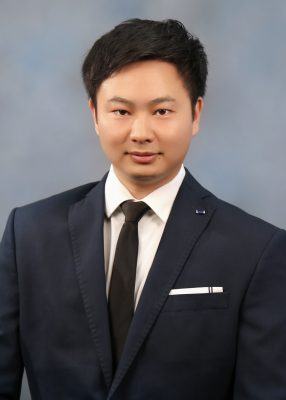 |
Junbo Zhao, Ph.D., IET Fellow Castleman Term Professor in Engineering Innovation Director, DOE Northeast University Cybersecurity Center for Advanced and Resilient Energy Delivery (CyberCARED) Research Scientist, National Renewable Energy Laboratory Department of Electrical and Computer Engineering University of Connecticut Email: junbo@uconn.edu |
Biography
Junbo Zhao is the director of DOE Northeast University Cybersecurity Center for Advanced and Resilient Energy Delivery (CyberCARED) and Castleman Term Professor in Engineering Innovation at the Department of Electrical and Computer Engineering at the University of Connecticut. He is also a Research Scientist at the National Renewable Energy Laboratory. He was an Associate Director of the Eversource Energy Center for Grid Modernization and Strategic Partnerships from 2022 to 2024. He was also an assistant professor and research assistant professor at Mississippi State University and Virginia Tech from 2019-2021 and 2018-2019, respectively. He received his Ph.D. from the Bradley Department of Electrical and Computer Engineering at Virginia Tech in 2018. His advisor is Prof. Lamine Mili (IEEE Life Fellow). He did a summer internship at Pacific Northwest National Laboratory in 2017.
He is the Principal Investigator for a multitude of projects funded by the National Science Foundation, the Department of Energy, DoD ESTCP, National Laboratories, Eversource Energy, Dominion Energy, Avangrid, ISO New England, etc. He is now leading multiple IEEE PES technical activities, such as the founding chair of the IEEE PES Working Group on Distribution System Behind-The-Meter DERs: Visibility, Analytics, and Control, chair of the IEEE Task Force on Cyber-Physical Interdependency for Power System Operation and Control, co-chair of the IEEE Working Group on Power System Static and Dynamic State Estimation, the secretary of the IEEE PES Distribution System Analysis Subcommittee, and IEEE PES Renewable Systems Integration Coordinating Committee. He has published 4 chapters and more than 200 peer-reviewed journal and conference papers. He serves as the Associate Editor of IEEE Transactions on Power Systems, IEEE Transactions on Industry Applications, International Journal of Electrical Power & Energy Systems, North America Regional Editor of the IET Renewable Power Generation, and subject editor of IET Generation, Transmission & Distribution. He was the associate editor of IEEE Transactions on Smart Grid and IEEE Transactions on Network Science and Engineering. He has been listed as the 2020-2024 World’s Top 2% Scientists released by Stanford University in both Single-Year and Career tracks.
He is the receipt of multiple recognitions, such as the Best Paper Awards from 2020-2024 IEEE PES General Meeting (10 papers), 2022 IEEE Conference on Energy Internet and Energy System Integration, 2019 and 2022 IEEE PES ISGT Asia, 2021 IEEE Sustainable Power and Energy Conference, IEEE I&CPS Asia 2021 and 2023, and the 2020 Journal of Modern Power Systems and Clean Energy, 2022 and 2023 Outstanding Associate Editor of IEEE Transactions on Power Systems, Top 3 Associate Editor of IEEE Transactions Smart Grid in 2020, the 2020 and 2022 IEEE PES Chapter Outstanding Engineer Award, the 2021 and 2022 Best Paper of IEEE Transactions on Power Systems (3 papers), the 2023 Best Paper Awards from International Journal of Electrical Power & Energy Systems, the 2021 IEEE PES Outstanding Volunteer Award, the 2022 and 2024 IEEE PES Technical Committee Working Group Recognition Award for Outstanding Technical Report (3 awards), 2023 AAUP Research Excellence Award-Early Career, 2022 IEEE PES Outstanding Young Engineer Award (Society Level for one per year worldwide), 2023-2025 IEEE PES Technical Committee Prize Paper Award (3 awards), 2023 IEEE PES Working Group Recognition Award for Outstanding Technical Report (Society Level), 2024 Best Paper Award from IEEE Transactions on Smart Grid, 2024 Early-Career Research Fellowship of National Academies of Sciences, Engineering, and Medicine, 2024 IEEE PES Technical Committee Distinguished Individual Service Award and 2025 NSF CAREER Award. He is a Fellow of IET and the Editor-in-Chief of the International Journal of Electrical Power & Energy Systems (Impact Factor: 5 and JCR Q1).
Research Interests
My research interests are cyber-physical power system modeling, monitoring, uncertainty quantification, learning, dynamics, stability control, and cyber security with DERs. The topics include but are not limited to
- Power system modeling, estimation, identification, and synchrophasor measurement applications
- Power system uncertainty quantification, cybersecurity, and resiliency
- Power system dynamics and stability control with inverter-based resources
- Big data analytics, machine learning, and robust statistical signal processing for smart grid
- Power distribution system/microgrid analysis, optimization, and control with high penetration of DERs